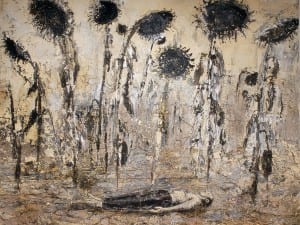Collapsing ideologies are collaboratively explored in European theatre – Mark Ravenhill and Ramin Gray’s production of Over There personalises the political.
2009 marks both the 20th anniversary of the fall of the Berlin Wall, and the 60th anniversary of the establishment of the Federal Democratic Republic of West Germany. To mark the event the Royal Court is working with the Goethe-Institute, the Schaubühne am Lehniner Platz in Berlin, and the German Federal Cultural Foundation on a series of new plays about Germany. The Off the Wall Season will showcase a week of readings of new German plays as well as new productions penned by Marius von Mayenburg and Mark Ravenhill.
Mark Ravenhill’s latest offering Over There, is directed by Ramin Gray and explores the contradictions of a city divided for 40 years by a physical wall and an intangible ideology. Ramin Gray discusses the new season and his hopes for engaging more with the German aesthetics of theatre-making in the 21st century: “the project commissioned writers in various countries to write about collapsing ideologies because that’s what the wall was about.” In their own direct and indirect ways, the writers then interpreted and personalised the transcendent theme. Off the Wall is also integral in continuing the Royal Court’s long-term collaboration with Berlin theatre, “a very fruitful exchange of playwrights and directors going backwards and forwards;” and the partnership has seen seminal writers such as Ravenhill and Sarah Kane flourish creatively over the years. The Goethe-Institute’s writing projects are taking place throughout Europe, and the artistic collaboration highlights the unification of not just a country, but also a continent that has long been divided. Gray explains that “Marius’ play is set in Dresden and in the middle of it is the firebombing of Dresden, a horrific moment of the allies dropping huge numbers of bombs, but there’s something wonderful about the fact that it’s Berlin and London who are having a very strong theatrical relationship now.”
Off the Wall embraces the experience of the individual to understand a wider political context and emphasises the continued importance of recent history as something which continually affects people — “you often think of history as either something that has happened or something rather abstract, but actually all around us people’s lives are being absolutely shaped by huge political economic social events over which they have no control whatsoever.” Ravenhill’s particular talents in aligning the two enabled him to be co-commissioned by the Royal Court and the Schaubühne to write the play, “Mark is a brilliant writer for that, because he’s a playwright with two very different sides to his personality. He’s very good at writing Brechtian political social epics, but at the same time he’s a brilliant notator of naturalistic, real tangible detail.” The play explores the reunion of two identical twins, Franz and Hanz, after the fall of the wall in November 1989, following the moment when their mother fled to the west with Franz in the middle of the Cold War. “It’s a play about how politics and the great movements of history impact on real ordinary lives” and the narrative consists of various flashbacks exploring their mother’s prosperous existence in the west in comparison to their father’s banal, alcoholic demise in the east. With fantasy sequences dreaming about a move to America and expositions on two very different upbringings, Over There encompasses the realities of existence in a divided nation, but Ravenhill was keen to maintain a humour in the production, something that would bring the events back towards a personal experience. “The mother very comically is confused as to which son she took with her” and the casting of the Tredaway twins creates opportunities for both a real authenticity in the production, and the traditional theatrical farces so often associated with confused identities.
The naming of the protagonists as Hanz and Franz represents an almost everyman characterisation, highlighting Ravenhill’s emphasis on the personal implications of what could otherwise be an indeterminate overview of political movements. “When you’re writing a play about something that is so massive and abstract as collapsing ideologies, it is very difficult, because plays are about human beings. Vague specifications rarely work because there is no such real person as Mr Communism. You have to start from a personal place. Mark came up with the idea of identical twins because of this. So it is about a separation by ideology, but there’s a tangible family story at the heart of it.”
With the commissioned playwrights encouraged to write about the collapse of ideologies in their own society, Ravenhill “originally thought he’d write about Thatcherism or Blairism, but found he kept coming back to 1989 and the fall of the wall as a really defining moment.” He subsequently shifted his interests to Berlin. The play emphasises the complexities of the German existence as a backdrop to Hanz and Franz’s experiences. Despite its unification for the past 20 years, Berliners remain attuned to the differences in their Eastern and Western culture. “There’s a tenor about how they behave and how they are, there’s a real difference. They were such profoundly different societies, living with a shared language, living right next door to each other, there’s nothing comparable in the English experience.”
After completing his first draft in 2008 Ravenhill spent the latter half of the year conducting research into the experiences of Berliners of all ages before and after the fall of the wall, placing a real emphasis on authenticity to counteract the connotations of writing on another country — “Germans can tell whether someone’s an Ossi or a Wessi (an eastie or a westie)” and this is something which Ravenhill needed to explore. Similarly Gray hopes to match these revisions of the script with his own influences from German theatre. “Mark’s had to do quite a lot of research to really get inside the mindset and I hope there’s a way in the production of making it really visible.”
There is a clear difference to the role of director in German and English productions, and as an experiment concentrating on Germany Gray hopes to embrace the greater freedoms that German direction affords over the playwright. “I’ve certainly got an ambition to try to get some of that German aesthetic into it, because when you see productions over there they are very different to the work we do over here. Here the director’s job is this sort of abstract, neutral conduit, whereas in Germany, the director is expected to make interventions.” Having previously been quoted as seeing his role as facilitator towards the playwright’s work, Gray is revising his own interpretations to introduce a more independent direction to February’s production. “I was trying to say that in a provocative way, but I’m so bored of that. Mark and I are old enough and know each other well enough to think there are other ways of doing it, and we’d like to explore that.”
The Off the Wall season, and its fellow anniversary projects around Europe showcase a collaboration between institutions, and Over There hopes to represent the ubiquitous nature of political experience. By exploring a very notable event, of which there is little comparison in Britain, Ravenhill and Gray feel that “the more specific it is about the German experience, the more chance perhaps it has of resonating about other things in England, like for example class.” The context through which this production has come to being has created an atmoshpere of real cross-cultural fraternisation and a European alliance. By alerting British theatre-goers to both the German existence and the German treatment of drama in the 21st century, Ravenhill and Gray’s work promises an exciting exposition of a familiar theme.
Over There, and Marius von Mayenburg’s The Stone was performed at the Royal Court alongside other events as part of the Off the Wall season from 25 February – 21 March 2009. www.royalcourttheatre.com.
Pauline Bache





